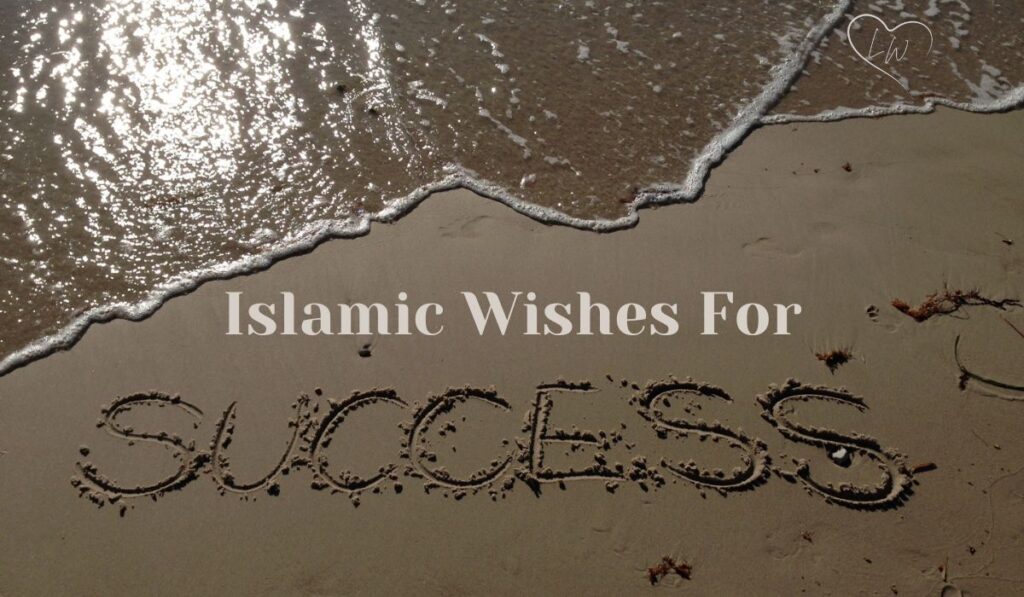More Than a Greeting: Ramadan Mubarak
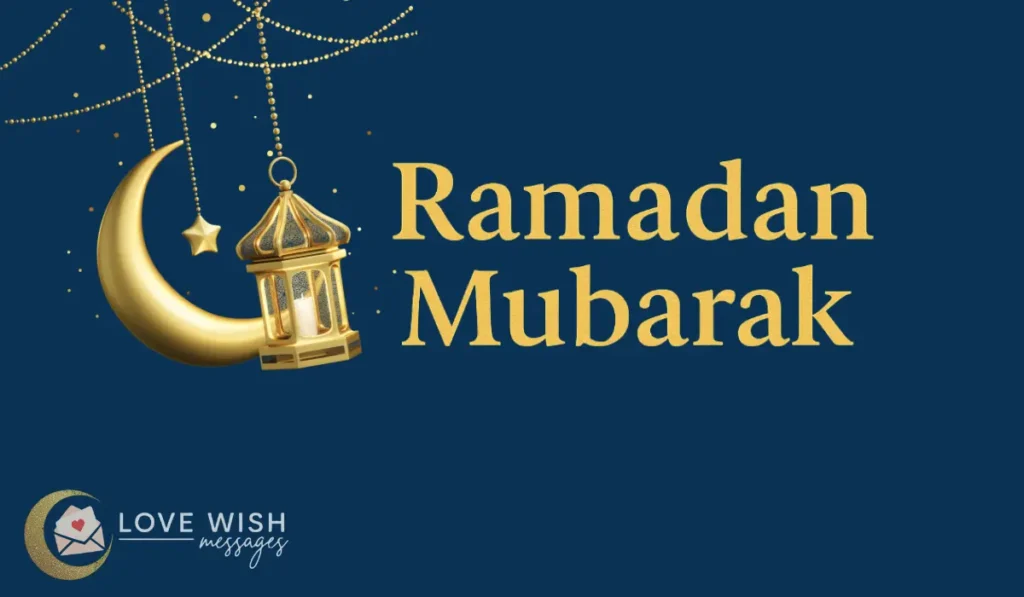
You know that moment before dawn in Ramadan? When the streets are still, the sky’s just starting to shift, and everything holds its breath? It’s not just silence—it’s something deeper. There’s weight in the air. You can almost feel the prayers hanging gently around you. Somewhere, there’s a soft Qur’an recitation in the background, the quiet clink of a spoon stirring a pot, maybe the smell of warm bread or tea wafting from the kitchen. It feels right. It feels sacred.
Then someone says, “Ramadan Mubarak.” Simple words, sure. But they land different. It’s not just a polite greeting—it’s more like: I see you. I’m praying this month brings light to your heart and ease to your soul. It’s small, but it carries something big. Something warm. Like the world holding you just a little closer.
What Does Ramadan Mubarak Mean?
It’s easy to think of Ramadan Mubarak as just a phrase—something you say at the start of the month and move on from. But for many of us, it means much more than that. It’s a reminder. A little spark of connection. A kind of du‘ā in disguise.
Literally, Ramadan Mubarak means “Blessed Ramadan.” But when spoken from the heart, it’s like saying: “I hope this month brings you peace where you need it most. I hope you come out of it lighter, cleaner, closer to Allah.” It’s a gentle kind of hope that gets passed from one person to another, wrapped in a smile or sent quietly in a message just after moon-sighting is confirmed.
In the world of Ramadan greetings, this one stands apart—not just because it’s traditional, but because it feels deeply personal. It’s soft, but it lands strong.
A Greeting That Holds More Than Words
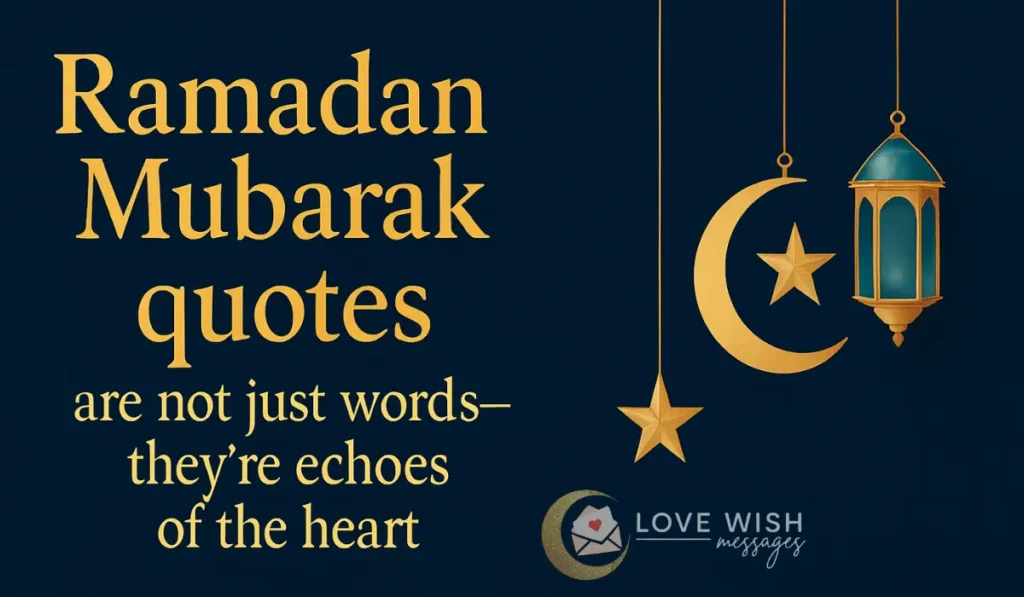
You could be in a crowded mosque, in line at the grocery store, or texting a friend late at night—and that Ramadan Mubarak can still reach you in a way that matters. Maybe because this month is heavier. Holier. A time when hearts are more open, more fragile, more tuned in.
Unlike generic holiday wishes, a Ramadan message is often layered with spiritual intention. It reflects what this month is about: not just fasting, but re-centering. Not just abstaining, but returning—to Allah, to stillness, to purpose.
As Allah says in the Qur’an:
يَا أَيُّهَا الَّذِينَ آمَنُوا كُتِبَ عَلَيْكُمُ ٱلصِّيَامُ كَمَا كُتِبَ عَلَى ٱلَّذِينَ مِن قَبْلِكُمْ لَعَلَّكُمْ تَتَّقُونَ
“O you who have believed, fasting is prescribed for you as it was prescribed for those before you, that you may attain taqwā (God-consciousness).”
— Surah Al-Baqarah 2:183 – Quran.com
When someone says Ramadan Mubarak, that’s what they’re really wishing for you: taqwā. That by the time Eid comes around, your heart feels different—in the best way.
Ramadan Mubarak in Today’s World
In today’s fast-scrolling, constantly pinging world, even the simplest Ramadan greeting can pause the noise. A friend DMs you “Ramadan Mubarak!” You open it in the middle of your busy day. It’s just two words—but they remind you of suhoor at your mother’s table, of the sound of the adhaan at sunset, of the Qur’an you meant to pick up again.
These are not small things. They pull you back. They ground you. And in that way, Ramadan Mubarak becomes more than a social custom—it becomes a soft call back to your faith.
It’s the kind of phrase that slips past surface-level pleasantries and touches something deeper. Maybe it’s the timing. Maybe it’s the month itself. But somehow, when those words show up in your inbox or whispered between co-workers on a quiet afternoon, they don’t just say “Happy Ramadan.” They say: “I see you trying. I see you remembering.”
Because let’s be honest—life moves fast. Notifications never stop. Work piles up. Responsibilities pull us in every direction. But then someone pauses their own day just long enough to say “Ramadan Mubarak,” and suddenly, your day feels lighter. It’s like someone opened a window, just a little, to let a breeze of Barakah in.
And maybe you say it back. Maybe you forward that message on to someone else. And just like that, a cycle of quiet blessings begins—through two simple words that carry centuries of meaning, culture, love, and taqwā.
Ways to Share the Blessing of Ramadan Mubarak
We all want to say something that feels sincere—especially in a month like this. Whether you’re sending a message to a friend, posting on social media, or just whispering a prayer for someone in your heart, there’s beauty in choosing your words with intention.
And while Ramadan Mubarak says a lot in just two words, sometimes you want to say a little more. Something that reflects the depth of this month. Something that leaves the person on the other side feeling seen, remembered, and spiritually uplifted.
Here are a few heartfelt ways to share the blessing.
Ramadan Mubarak Wishes for Family and Friends
- Ramadan Mubarak. May this month soften your heart, ease your burdens, and bring you closer to the One who never forgets you.
- Wishing you a Ramadan full of quiet strength, deep reflection, and light that stays long after the month ends.
- May your fasts be easy, your prayers accepted, and your soul nourished. Ramadan Mubarak to you and your family.
- As you rise for suhoor and break your fast at sunset, may every moment bring reward and peace.
- Ramadan Mubarak. May this be the month where your heart finds what it’s been quietly asking for.
If you’re looking for more ready-to-send messages, explore our full list of 100+ Ramadan Wishes & Blessings—perfect for texts, cards, or sharing online.
Short Ramadan Mubarak Quotes to Share
These short Ramadan Mubarak quotes are perfect for image captions, WhatsApp messages, or quiet reminders to uplift someone’s soul:
- “Ramadan Mubarak isn’t just a greeting. It’s a prayer wrapped in love.”
- “Say Ramadan Mubarak with your heart in it. Say it like a du‘ā.”
- “Behind two words lies a world of taqwā, mercy, and light.”
- “Ramadan is not just for fasting. It’s for returning—to faith, to stillness, to Allah.”
- “May your Ramadan begin with forgiveness and end with Jannah.”
Simple but Powerful Duas to Include in a Message
Sometimes the most meaningful Ramadan greeting is a short, heartfelt du‘ā. Here are a few that carry weight:
- “Allāhumma taqabbal ṣiyāmanā wa qiyāmanā.”
O Allah, accept our fasting and our night prayers. - “Allāhumma innaka ʿafuwwun tuḥibbul-ʿafwa faʿfu ʿannī.”
O Allah, You are forgiving and love to forgive, so forgive me. (Tirmidhī) - “Allāhumma ballighnā laylat al-qadr.”
O Allah, allow us to reach the Night of Decree.
For more powerful supplications during the holy nights, visit our collection of Laylatul Qadr Duas in English.
Ramadan Messages to Strengthen Someone’s Īmān
- Ramadan Mubarak. May this month renew your īmān in the quietest, most healing ways.
- Sending prayers that your soul feels lighter and your heart more anchored by the end of this blessed month.
- In this sacred time, may you rediscover the beauty of prayer, patience, and inner peace.
- May Allah grant you strength in your fast, clarity in your decisions, and calm in your heart.
Looking for inspiration to stay motivated this Ramadan? Explore our Islamic Motivational Quotes: Faith, Strength & Success to uplift yourself and others.
Want to Wish Someone Success During Ramadan?
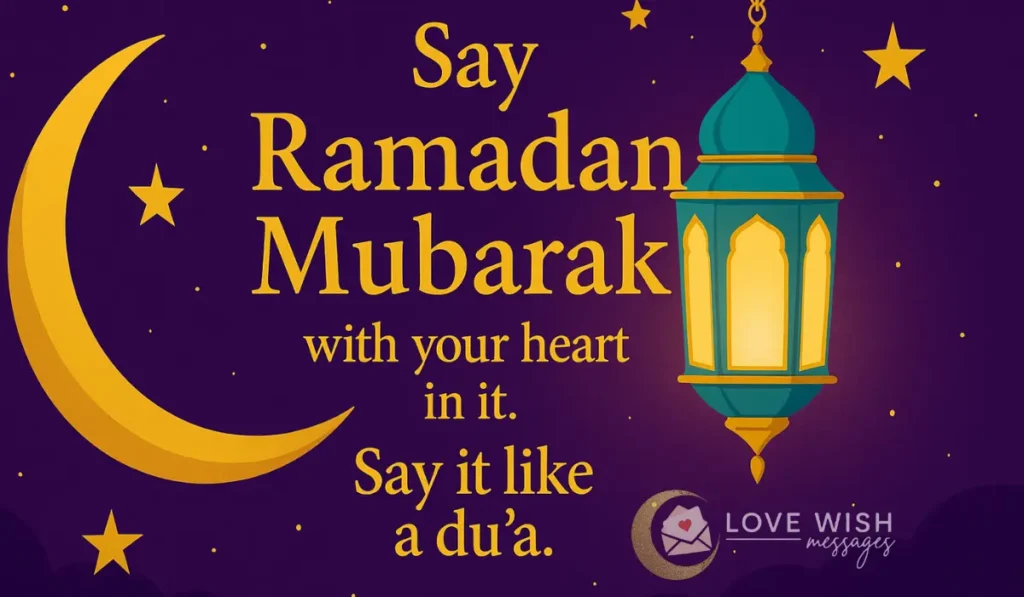
Ramadan is not only a time for worship—it’s also a time when we ask Allah for guidance in our work, studies, relationships, and long-term goals.
- May Allah open doors for you this Ramadan—spiritually and in all areas of your life.
- Wishing you success in your goals, clarity in your purpose, and ease in every test.
- Ramadan Mubarak. May your efforts this month bring you both worldly success and eternal reward.
You can find more duas and wishes like these in our full guide:
735+ Islamic Wishes for Success
Quranic Verses and Hadith on Ramadan
When we say Ramadan Mubarak, we’re not just exchanging words—we’re echoing what the Qur’an and Sunnah call us toward. This month isn’t simply special because of tradition; it’s sacred because Allah Himself has declared it so. Through the Qur’an and the teachings of the Prophet ﷺ, we learn why these days are unlike any other.
Here are selected verses and hadith that remind us why Ramadan is a month of mercy, reflection, and transformation.
Qur’anic Verses About Ramadan
Surah Al-Baqarah 2:185
شَهْرُ رَمَضَانَ ٱلَّذِىٓ أُنزِلَ فِيهِ ٱلْقُرْآنُ هُدًىۭ لِّلنَّاسِ وَبَيِّنَـٰتٍۢ مِّنَ ٱلْهُدَىٰ وَٱلْفُرْقَانِ
“The month of Ramadan [is that] in which was revealed the Qur’an—a guidance for mankind, clear proofs of guidance and the criterion.”
— Surah Al-Baqarah 2:185 – Quran.com
The revelation of the Qur’an is what gives Ramadan its soul. Every time we say Ramadan Mubarak, we’re honoring that moment in history when divine light came down to guide our hearts. This verse reminds us: Ramadan is not just for fasting—it’s for realigning with the Book that gives life meaning.
Authentic Hadith About Ramadan
1. The Gates Are Opened
“When the month of Ramadan begins, the gates of Paradise are opened, the gates of Hell are closed, and the devils are chained.”
— Sahih al-Bukhari 1899, Sahih Muslim 1079
Ramadan shifts not just your schedule—but the entire unseen world. Doors of mercy swing open. Spiritual distractions are locked away. And Allah invites your heart home.
2. Sins Forgiven Through Sincere Fasting
“Whoever fasts in Ramadan out of faith and in the hope of reward, his previous sins will be forgiven.”
— Sahih al-Bukhari 38, Sahih Muslim 760
This hadith is like a hand reaching out to the one who feels behind. Even if your year wasn’t perfect—even if you’re coming into this month feeling far—your fast is your chance to be forgiven, completely.
3. The Gate of Ar-Rayyan
“There is a gate in Paradise called Ar-Rayyan, through which only those who fast will enter on the Day of Resurrection. No one else will enter through it.”
— Sahih al-Bukhari 1896
Imagine that. A door in Jannah—marked just for those who held hunger for the sake of Allah. A gate that knows your name, your effort, your patience. This is part of the reward tied to the words Ramadan Mubarak—a reminder that this month holds eternal significance.
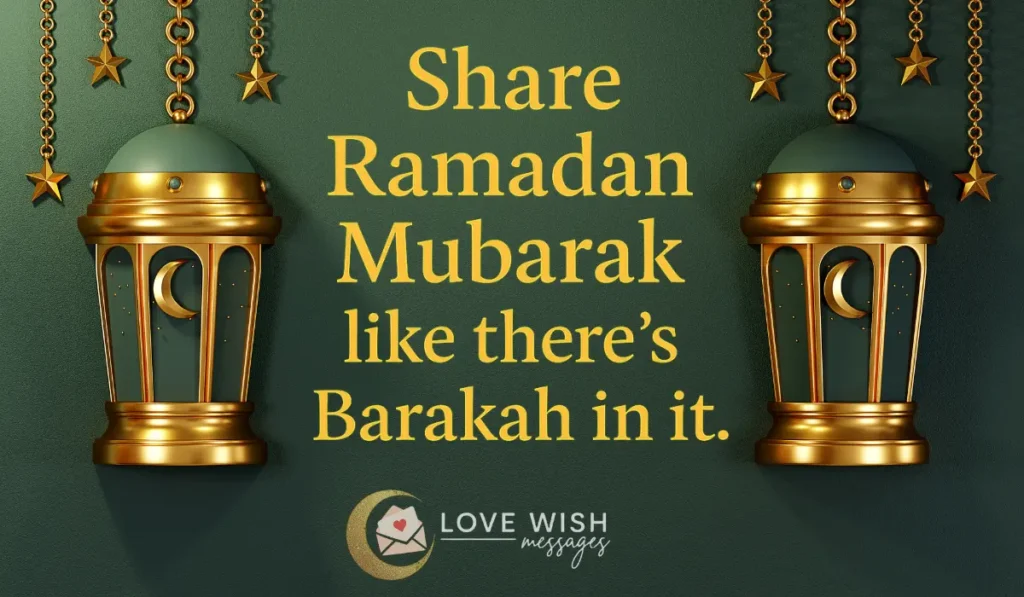
Conclusion & Final Dua
By now, you’ve probably said Ramadan Mubarak more times than you can count. To your family, your friends, your coworkers, even strangers. But maybe now, you’ll say it differently.
Because behind those two words is a quiet universe of meaning. It’s a reminder of why we fast, why we pause, and why we return. It holds the mercy of Allah, the light of the Qur’an, and the hope that this month can change something inside us—something real.
So whether you’re sending a message, greeting someone after taraweeh, or whispering it at the start of a long day—say Ramadan Mubarak with your heart in it. Say it like a dua.
Final Dua
Allāhumma ballighnā Ramaḍān wa taqabbal minnā ṣiyāmanā wa qiyāmanā wa adhkurnā fī man tuḥibb. Allāhumma aj‘alhu shahra taqwā, raḥmah, wa maghfīrah.
“O Allah, allow us to reach Ramadan and accept from us our fasting and prayers. Count us among those You love. Make this a month of taqwā, mercy, and forgiveness.”
Āmīn.
For more ways to spiritually uplift and support others, explore:
– 100+ Ramadan Wishes & Blessings
– Islamic Gratitude, Inner Peace & Blessings
– 459+ Islamic Quotes for Patience & Being Silent
FAQs About Ramadan Mubarak
1. What does “Ramadan Mubarak” mean?
Ramadan Mubarak is an Arabic phrase that means “Blessed Ramadan.” It’s a greeting exchanged by Muslims to celebrate the arrival of the holy month. Saying Ramadan Mubarak is more than being polite. It’s a way of offering someone your best wishes for a spiritually meaningful and rewarding Ramadan.
2. How do you respond to “Ramadan Mubarak”?
A warm and simple response is: “Ramadan Mubarak to you too.”
Other heartfelt replies include:
“Jazāk Allāhu khayran, wa anta/anti faḍlallāh.” (May Allah reward you, and you too.)
“Ramadan Kareem!” (A generous Ramadan to you!)
“Taqabbal Allāhu minnā wa minkum.” (May Allah accept from us and from you.)
You can learn more in our guide:
→ 100+ Ramadan Wishes & Blessings
3. Is there a difference between Ramadan Mubarak and Ramadan Kareem?
Yes, though both are commonly used Ramadan greetings, they carry slightly different meanings:
Ramadan Mubarak means “Blessed Ramadan,” focusing on barakah (divine blessings).
Ramadan Kareem means “Generous Ramadan,” highlighting Allah’s mercy and generosity during this month.
Both are widely accepted, and either can be used depending on cultural or regional tradition.
4. Can non-Muslims say “Ramadan Mubarak”?
Yes, many non-Muslims use Ramadan Mubarak as a respectful and thoughtful way to greet Muslim friends, coworkers, or neighbors. It’s always appreciated when said with sincerity and understanding.
5. What’s the best way to share a Ramadan Mubarak message?
You can share Ramadan Mubarak in person, through a message, a card, or even on social media. The best messages often include a personal dua or thoughtful line that shows you truly care.
Here are some beautiful examples:
→ 735+ Islamic Wishes for Success
→ Islamic Motivational Quotes
